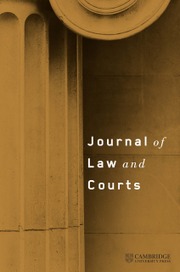Article contents
Support for Nationalization and State Building in the Early American Republic
The Act for the Relief of Sick and Disabled Seamen
Published online by Cambridge University Press: 21 October 2022
Abstract
House deliberations over healthcare legislation in 1798 show members of the Fifth US Congress debating the constitutional basis of small government assumptions about states’ rights and federal power, asking why the regime’s principles should not be understood as requiring direct federal intervention in the lives of socially and economically vulnerable groups irrespective of states’ authority. Extending the current scholarly debate over nationalization and state building in early American thought, I suggest that questions alleged by many scholars to have been excluded from political and constitutional debate in the early republic were, in cases like this, robustly contested.
- Type
- Articles
- Information
- Copyright
- © 2021 Law and Courts Organized Section of the American Political Science Association. All rights reserved.
Footnotes
I would like to thank Justin Wedeking and the four anonymous reviewers for their thoughtful criticisms and suggestions, as well as the participants of the 2019 Shawnee Trail Conference at the University of Colorado–Colorado Springs, who provided feedback on an earlier version of this paper. I am particularly grateful to Gary J. Jacobsohn for his support and for urging me to undertake this project in the first place.
References
- 1
- Cited by


